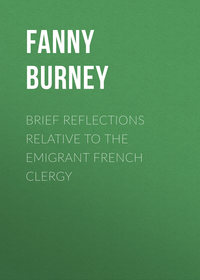Kitap dosya olarak indirilemez ancak uygulamamız üzerinden veya online olarak web sitemizden okunabilir.
Kitabı oku: «Brief Reflections relative to the Emigrant French Clergy»
APOLOGY
However wide from the allotted boundaries and appointed province of Females may be all interference in public matters, even in the agitating season of general calamity; it does not thence follow that they are exempt from all public claims, or mere passive spectatresses of the moral as well as of the political œconomy of human life. The distinct ties of their prescriptive duties, which, pointed out by Nature, have been recognised by reason, and established by custom, remove, indeed, from their view and knowledge all materials for forming public characters. The privacy, therefore, of their lives is the dictate of common sense, stimulated by local discretion. But in the doctrine of morality the reverse is the case, and their feminine deficiencies are there changed into advantages: since the retirement, which divests them of practical skills for public purposes, guards them, at the same time, from the heart-hardening effects of general worldly commerce. It gives them leisure to reflect and to refine, not merely upon the virtues, but the pleasures of benevolence; not only and abstractedly upon that sense of good and evil which is implanted in all, but feelingly, nay awefully, upon the woes they see, yet are spared!
It is here, then, in the cause of tenderness and humanity, they may come forth, without charge of presumption, or forfeiture of delicacy. Exertions here may be universal, without rivality or impropriety; the head may work, the hand may labour; the heart may suggest, indiscriminately in all, in men without disdain, in women without a blush: and however truly of the latter to withdraw from notice may be in general the first praise, in a service such as this, they may with yet more dignity come forward: for it is here that their purest principles, in union with their softest feelings, may blend immediate gratification with the most solemn future hopes. – And it is here, in full persuasion of sympathy as well as of pardon, that the Author of these lines ventures to offer to her countrywomen a short exhortation in favour of the emigrant French Clergy.
The astonishing period of political history upon which our days have fallen, robs all former times of wonder, wearies expectation, sickens even hope! while the occurrences of every passing minute have such prevalence over our minds, that public affairs assume the interest of private feelings, affect domestic peace, and occupy not merely the most retired part of mankind, but even mothers, wives, and children with solicitude irresistible.
Yet the amazement which has been excited, though stupendous, though terrific, by the general events that in our neighbour kingdom have convulsed all order, and annihilated tranquility, is feeble, is almost null, compared with that produced by the living contrast of virtue and of guilt exhibited in the natives of one and the same country; virtue, the purest and most disinterested, emanating from the first best cause, religion; and guilt, too heinous for any idea to which we have hitherto given definition.
The emigrant French Clergy, who present us with the bright side of this picture, are fast verging to a situation of the most necessitous distress; and, notwithstanding the generous collections repeatedly raised, and the severest œconomy unremittingly exercised in their distribution, if something further is not quickly obtained, all that has been done will prove of no avail, and they must soon end their hapless career, not by paying the debt of nature, but by famine.
That the kingdom at large, in its legislative capacity, will ere long take into consideration a more permanent provision for these pious fugitives, there is every reason to infer from the national interest, which has universally been displayed in their cause. To preserve them in the mean time is the object of present application.
So much has already so bountifully been bestowed in large donations, that it seems wanting in modesty, if not in equity, to make further immediate demands upon heads of houses, and masters of families.
Which way, then, may these destitute wanderers turn for help? To their own country they cannot go back; it is still in the same state of lawless iniquity which drove them from it, still under the tyrannic sway of the sanguinary despots of the Convention.
What then remains? Must their dreadful hardships, their meek endurance, their violated rights, terminate in the death of hunger?
